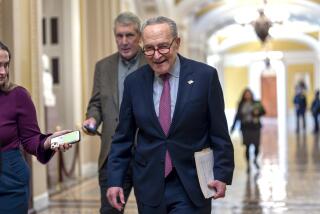Senate banking panel OKs sweeping financial overhaul bill
Reporting from Washington — With President Obama ready to sign the historic healthcare reform bill, the White House and its Democratic allies in Congress aggressively pressed forward Monday on their next major legislative priority -- a sweeping overhaul of financial regulations.
Treasury Secretary Timothy F. Geithner declared that the debate had reached “a defining moment” as the Senate Banking Committee moved quickly to approve the legislation on a 13-10 party-line vote.
The bill, based on a proposal by the Obama administration, is similar to one the House passed in December without a single Republican vote.
“We are now one step closer to passing real financial reform that will bring oversight and accountability to our financial system and help ensure that the American taxpayer never again pays the price for the irresponsibility of our largest banks and financial institutions,” President Obama said.
The legislation would enact the most sweeping set of financial regulations since the Great Depression. It would create an agency to protect consumers in the financial marketplace; create a council of regulators to monitor the economy for signs of major risk; give the government power to seize and dismantle large firms whose failure would pose a danger to the economy; and impose new regulations on hedge funds and complex financial derivatives.
The financial overhaul legislation is a priority of the Obama administration. The White House is pressing hard for approval before the November midterm elections so Democrats can show they’ve cracked down on Wall Street excesses and taken bold steps to avoid another crisis.
“The stakes are too high -- and the American people have suffered too greatly -- for us to fail in this effort,” said Senate Banking Committee Chairman Christopher J. Dodd (D-Conn.), who drafted the legislation with bipartisan input. “And we will not fail. We will have reform this year.”
Although Dodd’s bill differs from the House bill and the Obama administration proposal on some key points -- particularly in not making the new consumer agency a stand-alone entity -- the White House is eager to move the bill to a full Senate vote as the legislative calendar dwindles.
Although no Republicans on the banking committee voted for the bill Monday, Sen. Richard C. Shelby (R-Ala.) said he remained hopeful of a bipartisan compromise.
But as Dodd pressed to move before the Senate leaves Washington for its spring recess next week, Shelby said Republicans decided not to drag out the committee vote with a slew of amendments that most likely would have been voted down by the Democratic majority.
Instead, Republicans will work to amend the legislation before the full Senate, where they will have more leverage, he said. Republicans have enough votes to block the legislation, which unlike the healthcare bill now before the Senate will require the support of 60 senators to pass.
Shelby said the bill is better than the original version Dodd introduced last fall. But Shelby said he still wanted some changes on key components, such as limiting the government’s ability to engage in future bailouts.
“Although I have raised a number of serious concerns, I remain optimistic that we can, over time, reach an agreement that will garner broad bipartisan support,” Shelby said before the vote. “I just don’t believe we are there yet.”
The financial industry opposes key parts of Dodd’s bill as well, particularly the new consumer protection agency.
But Geithner on Monday urged lawmakers not to be deterred.
“Listen less to those whose judgments brought us this crisis. Listen less to those who told us all they were the masters of noble financial innovation and sophisticated risk management,” Geithner said in a speech to the conservative American Enterprise Institute.
“Instead, listen to the families and businesses still suffering from this crisis.”
But Dodd faces a tough task getting his bill through the Senate. He must try to gain Republican votes while not making changes that would be opposed by Democrats.
Some liberals already have criticized a major move he made to try to lure Republican support -- housing the consumer agency in the Federal Reserve.
Dodd has stressed that the agency would be independent and not report to the Fed’s board.
But Americans for Financial Reform, a coalition of labor, consumer, civil rights and liberal activist groups, said Monday that it “remained concerned” about Dodd’s bill.
jim.puzzanghera @latimes.com
More to Read
Sign up for Essential California
The most important California stories and recommendations in your inbox every morning.
You may occasionally receive promotional content from the Los Angeles Times.











